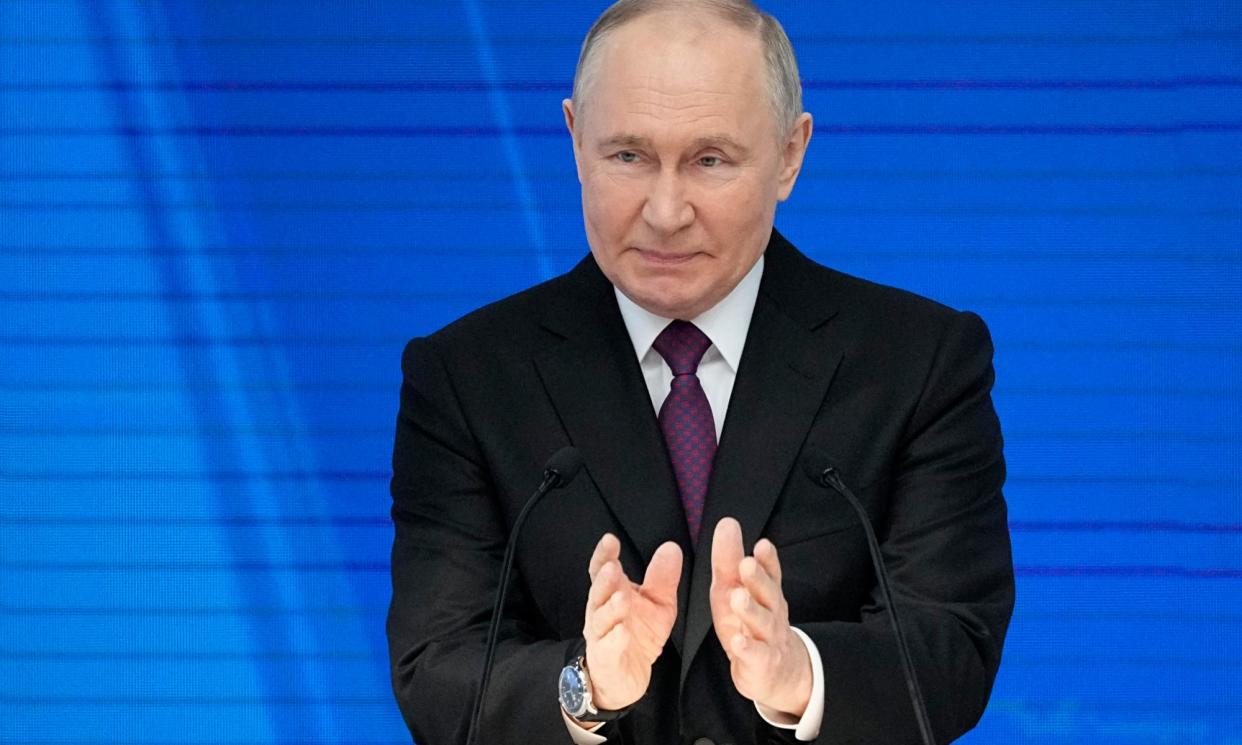Sending troops to Ukraine would risk provoking nuclear war, Putin tells Nato

Vladimir Putin has told Nato countries that they risk provoking a nuclear war if they send troops to fight in Ukraine, in an annual state of the nation speech ramping up his threats against Europe and the US.
In a reference to Emmanuel Macron’s comments earlier this week in which he opened the door to sending European ground troops to Ukraine, the Russian president said it would lead to “tragic” consequences for the nations who decided to do that.
“There has been talk about the possibility of sending Nato military contingents to Ukraine,” Putin said in his combative two-hour address on Thursday.
“[Western nations] must understand that we also have weapons that can hit targets on their territory. All this really threatens a conflict with the use of nuclear weapons and the destruction of civilisation. Don’t they get that? We remember the fate of those who once sent their contingents to the territory of our country. Now the consequences for possible interventionists will be much more tragic.”
Putin described western warnings that Russia might attack Europe as “nonsense” but spoke of a potential nuclear conflict if the west tried an “intervention” in Russia.
“They think this is some kind of game. They are blinded by their own superiority complex,” he said.
Related: ‘Everyone needs to calm down’: experts assess Russian nuclear space threat
The French president’s comments earlier this week in which he refused to rule out sending troops to Ukraine prompted other western countries, including Germany and the UK, to say they had no such plans, though on Thursday the Estonian prime minister, Kaja Kallas, appeared to back Macron, saying leaders should discuss all options to help Ukraine.
Russia was ready to hold dialogue with the US on arms control, Putin said, but said the country’s nuclear forces were fully ready for use.
The Russian president, who was speaking just a few weeks before an election in which he is widely expected to win another six-year term in power, gave a rosy assessment of the war that has entered its third year, saying that Russian troops had “the initiative” and were “liberating new territories”.
His comments are backed by recent Russian successes on the battlefield as delays in US and EU military aid to Ukraine have already forced its troops to scale back some military operations, further lifting the mood in Moscow.
After capturing the strategic north-eastern Ukrainian town of Avdiivka earlier this month, Russian troops have seized three more villages in the past few days, indicating a growing momentum in their advance.
Putin appeared to repeat his hardline stance that demanded Ukraine’s unconditional surrender after Kyiv’s lacklustre counteroffensive this summer and delays in critical US military aid to Ukraine brought on by partisan infighting in Washington DC.
He called for the “denazification of Ukraine”, and said Russia would do “everything to achieve all our aims”.
Putin spent a considerable portion of the address discussing Russia’s population decline and the threat it poses to the country.
Russia suffered two decades of gradual population decline after the collapse of the Soviet Union, a problem exacerbated by Putin’s invasion of Ukraine, during which tens of thousands of Russian service personnel have been killed on the battlefield.
Putin proposed a series of financial measures to support large families while also criticising “western values” for destroying “family ties”.
This year’s state-of-the-nation speech was shown live in cinemas and public venues across the country, in an effort to boost Putin’s message before the presidential elections.
Allies of the late opposition leader Alexei Navalny said Russian authorities had intervened to stop them from holding his funeral on Thursday, as they worried it would overshadow Putin’s speech.
Putin is yet to comment on the death of his most formidable opponent.
Navalny’s supporters are expected to gather on Friday in Moscow for his funeral amid uncertainty whether police will arrest those who have come to say goodbye.


